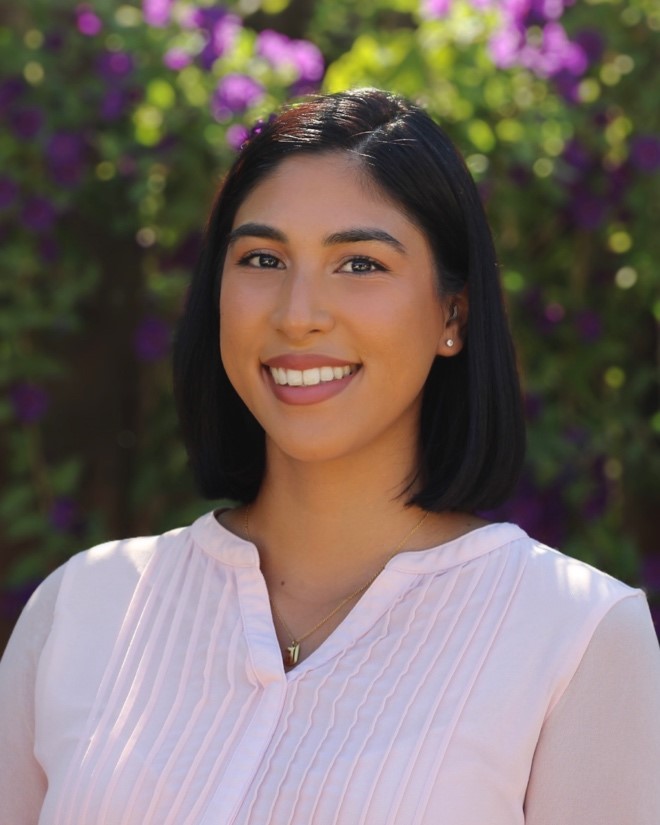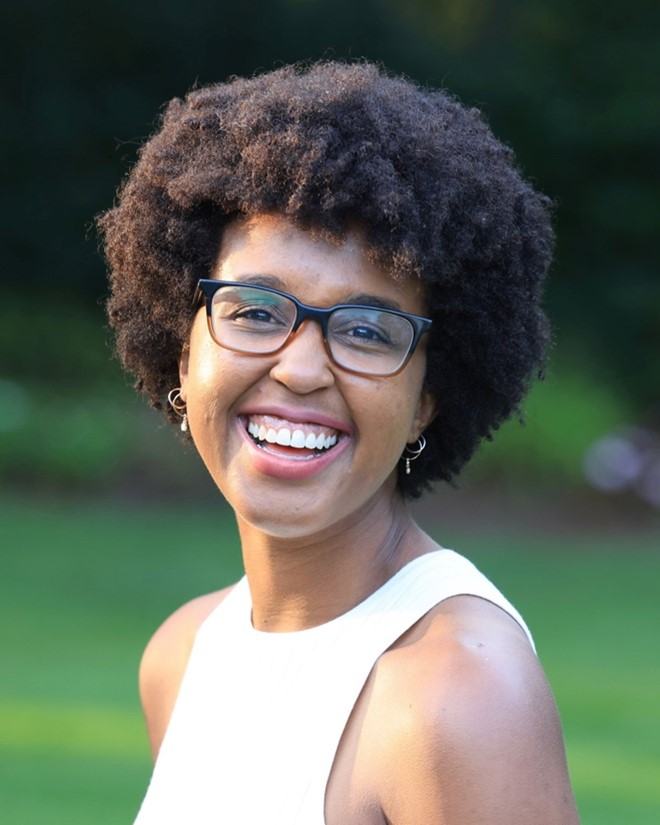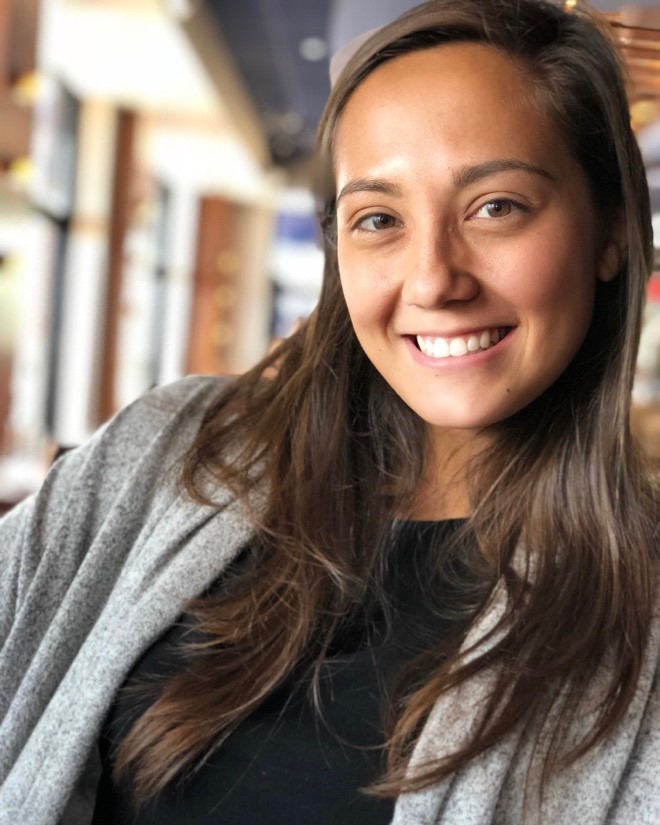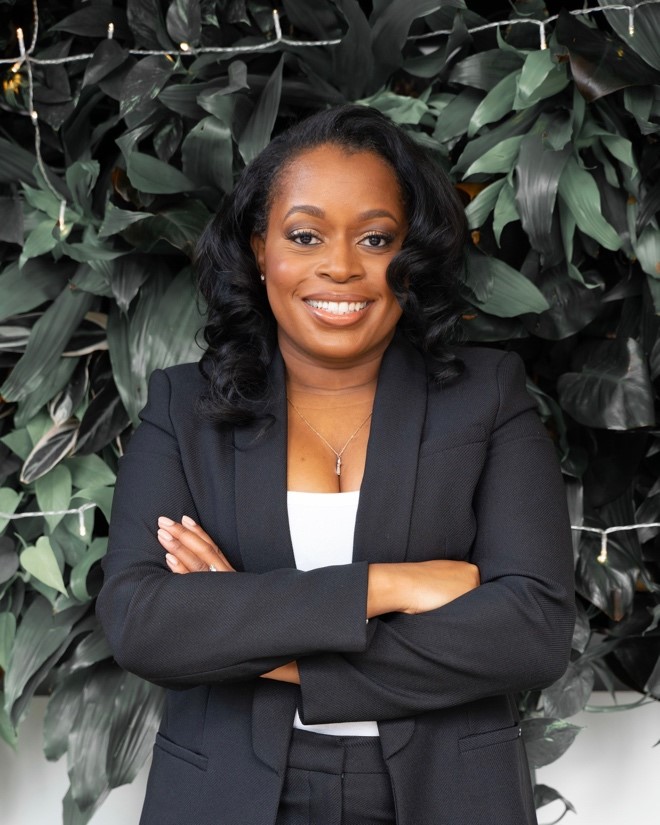Engaging students in research can enrich their knowledge and support their future confidence to pursue research careers. In this interview blog, Dr. Allen Ruby, Associate Commissioner for the Policy and Systems Division at NCER, asked four doctoral graduate students at Montclair State University, Melissa Escobar, Taylor Walls, Hannah Thomas, and Marline Francois, to reflect on what attracted them to an IES-funded research project led by Dr. Carrie Masia. The project aims to improve education outcomes for Black American high school students with anxiety attending urban public schools through the development of culturally-responsive interventions.
What are your research interests, and how does this project align with your interests?
 Melissa Escobar (ME): My research interests focus on optimizing access to evidence-based treatments for racial minority youth by training frontline providers in community and primary care settings to deliver them. I distinctly remember when I decided to pursue a career in psychology. I was working at a community youth center when the struggles of a Latinx mother deeply impacted me. Her husband's deportation to Mexico significantly altered her son's mood and schoolwork. She tearfully confided in me about her difficulties accessing mental health services for her son. She struggled to find a qualified provider who she believed understood their family's concerns, and the high cost of services and transportation prevented her from seeking care. Seeing the combination of cultural and structural barriers that influence mental health disparities within marginalized groups, I now align myself with research that advocates for high-quality depression and anxiety treatments in accessible locations for minority youth. This is why I found Dr. Masia's project a perfect fit for me. The project links the behavioral health and education sector to improve the mental health and academic achievement of historically marginalized youth with impairing anxiety.
Melissa Escobar (ME): My research interests focus on optimizing access to evidence-based treatments for racial minority youth by training frontline providers in community and primary care settings to deliver them. I distinctly remember when I decided to pursue a career in psychology. I was working at a community youth center when the struggles of a Latinx mother deeply impacted me. Her husband's deportation to Mexico significantly altered her son's mood and schoolwork. She tearfully confided in me about her difficulties accessing mental health services for her son. She struggled to find a qualified provider who she believed understood their family's concerns, and the high cost of services and transportation prevented her from seeking care. Seeing the combination of cultural and structural barriers that influence mental health disparities within marginalized groups, I now align myself with research that advocates for high-quality depression and anxiety treatments in accessible locations for minority youth. This is why I found Dr. Masia's project a perfect fit for me. The project links the behavioral health and education sector to improve the mental health and academic achievement of historically marginalized youth with impairing anxiety.
 Taylor Walls (TW): My research interests center around developing, implementing, and evaluating culturally sensitive interventions for children and adolescents with internalizing disorders in schools. A primary goal of this project is to use a school-based group intervention that has been shown to be effective in reducing social anxiety and revise it to address the unique needs of Black American students. It aims to consider the context of urban public schools and the culture of Black American adolescents. I have read about the importance of cultural adaptations to improve the quality and availability of these interventions for racial and ethnic minorities, and I welcome the opportunity to work closely on a project like this firsthand.
Taylor Walls (TW): My research interests center around developing, implementing, and evaluating culturally sensitive interventions for children and adolescents with internalizing disorders in schools. A primary goal of this project is to use a school-based group intervention that has been shown to be effective in reducing social anxiety and revise it to address the unique needs of Black American students. It aims to consider the context of urban public schools and the culture of Black American adolescents. I have read about the importance of cultural adaptations to improve the quality and availability of these interventions for racial and ethnic minorities, and I welcome the opportunity to work closely on a project like this firsthand.
 Hannah Thomas (HT): My research interests include optimizing evidence-based interventions for children and adolescents and the role of risk and protective factors in the development of internalizing disorders. My interest in these areas began when I worked at a summer program focused on bringing high school-aged student athletes, often from underserved communities, to learn leadership and sport psychology skills. This was a transformative experience, ultimately solidifying my interest to work with youth and interventions that teach skills to handle adversity. I was drawn to this IES project because it provides the opportunity to work with youth in a meaningful and impactful way.
Hannah Thomas (HT): My research interests include optimizing evidence-based interventions for children and adolescents and the role of risk and protective factors in the development of internalizing disorders. My interest in these areas began when I worked at a summer program focused on bringing high school-aged student athletes, often from underserved communities, to learn leadership and sport psychology skills. This was a transformative experience, ultimately solidifying my interest to work with youth and interventions that teach skills to handle adversity. I was drawn to this IES project because it provides the opportunity to work with youth in a meaningful and impactful way.
 Marline Francois (MF): My research interest is in exploring the psychological well-being of adolescent Black girls that experience racial and gender discrimination in education spaces. Furthermore, I am interested in creating gender and race-specific interventions for Black adolescent girls. My interest began after spending 15 years working as a therapist and recognizing the lack of interventions specifically for Black youth. I was also affected by the lack of adequate mental health services for Black youth coupled with their alarming increase in suicide rates. What I love about this project is that it aligns with my research interests and directly involves adolescents, which provides opportunities to learn from them and have them share their lived experiences.
Marline Francois (MF): My research interest is in exploring the psychological well-being of adolescent Black girls that experience racial and gender discrimination in education spaces. Furthermore, I am interested in creating gender and race-specific interventions for Black adolescent girls. My interest began after spending 15 years working as a therapist and recognizing the lack of interventions specifically for Black youth. I was also affected by the lack of adequate mental health services for Black youth coupled with their alarming increase in suicide rates. What I love about this project is that it aligns with my research interests and directly involves adolescents, which provides opportunities to learn from them and have them share their lived experiences.
What has been the most exciting aspect of this project for you?
ME: The most attractive part has been the opportunity to hear directly from students and parents on how to best address the needs of racial-ethnic minority families and develop culturally sensitive assessments and treatment strategies. Fully engaging with the community makes the work more meaningful to me. Also, the chance to have a hands-on approach in the research process from collecting qualitative data to developing interview guides and coding schemes makes me feel like my contributions are making a difference.
TW: As a fourth-year graduate student, this project is particularly exciting for me because I will be analyzing a portion of the data for my dissertation. It has expanded my research skills to formulate my own research questions to contribute information that is novel and of interest to my field. Furthermore, I enjoyed the aspects of this project that mirror my work as a clinician — speaking with children and their parents in one-on-one and small group settings to hear about their experiences and their feedback on how this program may be better tailored to their community. Having conversations with the individuals we want to impact makes this work particularly meaningful.
HT: The most exciting aspect of this project is the ability to be involved in multiple roles. I started at the beginning of the summer, and so far, I have been involved in conducting focus groups and developing a coding scheme for interview transcriptions. This excites me because I am able to diversify my skills as a researcher and gain experience in various research methods that may be useful for my dissertation.
MF: As a 3rd-year doctoral candidate, it has been exciting to see the process of this project from the beginning and being able to interview and interact with students and parents. I enjoyed the recruitment process and conducting focus groups and individual interviews. As a qualitative researcher, I appreciate the hands-on experience of learning how to conduct and the in-depth experiences shared by the students and parents, which will aid us in creating a more culturally sensitive intervention for Black youth.
What do you look for in a research supervisor or mentor?
ME: In addition to similar research interests, I look for a mentor who is respectful of personal boundaries. As graduate students, we have a lot of different responsibilities and having a mentor that shows you how to balance those roles is vital in keeping students engaged and successful. I have been fortunate to have a mentor who ensures that all work is evenly spread across all research team members. I also appreciate mentors who considers their students' personal goals and finds opportunities that align with them. For example, at the beginning of my graduate program, my mentor asked me what my goals were for the year, the program, and what type of work setting I saw myself in after graduation. This conversation has been beneficial in finding research opportunities, grants/scholarships, and clinical experiences that will help me meet my goals outside of working on research. Lastly, I take into consideration how available the mentor is. It is essential to maintain good communication through regular meetings and/or emails. This way, regular communication and feedback can happen in appropriate time frames, and any issues that arise are resolved quickly.
TW: It's important to me that a mentor has both interest in and time to support me in fostering my competence as a research professional and advancing my short- and long-term goals. This can be demonstrated in a number of ways, including recommending academic and professional development activities that will build my skills, providing constructive feedback in a respectful and supportive manner, and helping me manage challenges as they arise. I also prefer that my mentor shares in my passion for child-focused research and is eager to connect me with collaborators for projects or networking. Over the years, I've learned that I work best with mentors who grant me autonomy in my work, but I also benefit from frequent check-ins and strict deadlines. Finally, I appreciate a research mentor that provides encouragement and flexibility and acknowledges the importance of self-care and well-being.
HT: I looked for a research supervisor/mentor whose research interests aligned with mine. I found this to be important because not only are they knowledgeable in the area of research that I am interested in, but they also provide the right research opportunities to develop me on the road to an independent career.
MF: It was important for me to find a mentor with a research background that aligns to my research interests. I wanted to have someone that cared about my research interests and professional growth. Furthermore, it was important for me to find someone who was not afraid to give me constructive criticism on my ideas but also assist me with strategically planning for my future. As someone who values balance, it is also important for me to have a mentor who values my well-being.
What challenges have you faced when trying to find research projects that appeal to you, and what feedback would you give to graduate programs or faculty to better engage students in research?
ME: As a first-generation student, I did not know how to navigate finding research opportunities or emailing professors about potential opportunities. I quickly learned that most research opportunities aren't advertised and finding a role on a research team usually comes from word of mouth. I would encourage programs and faculty to do more to advertise research opportunities. I would also recommend that faculty welcome the involvement of undergraduate students in their labs. My research career began during the sophomore year of my undergraduate education. I would not have the experience I have today if that professor had not given me a chance. Even if the roles are small like doing audio transcription or data entry, all experience is valuable. Another suggestion would be to create a mentorship model within the lab with more senior students mentoring newer students. When relationships like this are built, students may feel more comfortable to try out new roles in the lab.
TW: In order to find research projects that appeal to me, I am diligent about seeking out faculty who are already doing work that interests me and are open to bringing on a collaborator. I appreciated that my graduate master's program hosted an open house at the beginning of each semester where students could meet faculty and be oriented to the research labs that were available to them. What helped me first want to get engaged in research was meeting faculty who were outwardly passionate about their work and created unique avenues for their students to get involved.
HT: I feel that I have been fortunate in obtaining research projects that appeal to me, and I attribute that to aligning myself with the right mentors. My past and current mentors are collaborative with other faculty and labs, which have allowed me to participate in a variety of research opportunities, further refining my research interests. My suggestion for graduate programs and faculty to better engage students in research is to encourage collaboration across faculty and labs.
MF: When I initially started my doctoral program, it was challenging to find the right research project that aligned with my interests. However, I believe it is important as a doctoral student to be flexible and adaptable to learning from other mentors. Furthermore, I found myself connecting with scholars and students from other disciplines and universities that had similar interests as myself. This has allowed me to learn to properly advocate for my needs and find a research lab that was more suitable for me. The advice I would give to graduate programs is to create more opportunities for graduate students across departments and disciplines tailored to various research needs. I also believe that universities can create more professional development training opportunities to better engage students in research, such as how to apply for competitive fellowships and grant opportunities during their studies.
This blog was produced by Allen Ruby (Allen.Ruby@ed.gov), Associate Commissioner for Policy and Systems Division, NCER.